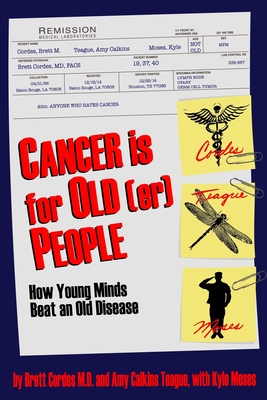Brett M. Cordes

This book, Cancer is for Old(er) People, began in 1997, when I wrote extensively about my experience battling Non-Hodgkin’s Lymphoma. That writing has stayed, untouched, at my parent’s house in Louisiana for the last 2 decades. I had entitled it “Cancer is For Old People,” as it was written BY a teenager/young person…FOR young people.
My very close and oldest childhood friend, Amy Calkins Teague, who literally grew up across the street from me in Baton Rouge, was diagnosed and battled Ovarian cancer from 2014-2018….she is currently in remission! In March of this year, I encouraged her to write about her experience, and boy did she! We are heavily involved in each other’s story in switching roles as both patient and friend/confidant.
My experience led, among other things, to my becoming a doctor and for the opportunity and blessing for Katie (my wife) and me to adopt two wonderful children into our family. Amy has volunteered extensively in Baton Rouge in a variety of ways, and has been a model patient and advocate within the local community. Her picture has been on the billboard for the Baton Rouge Cancer Center, she is the subject of a promotional video for the treatment facility, and she spends a great deal of time advocating for and supporting cancer patients in the community.
Another good friend of mine, Kyle Moses, was diagnosed with a rare Germ Cell Tumor in 2012 and battled it for 2 years, ultimately culminating in TWO Stem Cell Transplants. He is an Army veteran and credits, along with his Christian faith, the Army and his training for his resulting survival. He tells his story in a straightforward, matter-of-fact style that boasts a dry humor and just a skosh… of cynicism. He has said that “My boys tell me that post-cancer dad is better than pre-cancer dad!”
The book has several themes but two main ones are: 1) the often-times undervalued, yet heroic, role of the caregiver and how cancer affects the patient AND their family and loved ones alike and, 2) how even the most “inspirational” and “good” cancer patients have deep, raw, angry, frustrating, and embarrassing moments and feelings that often are hidden from others…but felt by all! And we feel that patients should never feel guilty or ashamed for having such feelings, as they are almost universal for most people stricken with this terrible disease.
I tie our stories together and also reflect on my writings and experiences from 22 years ago.

